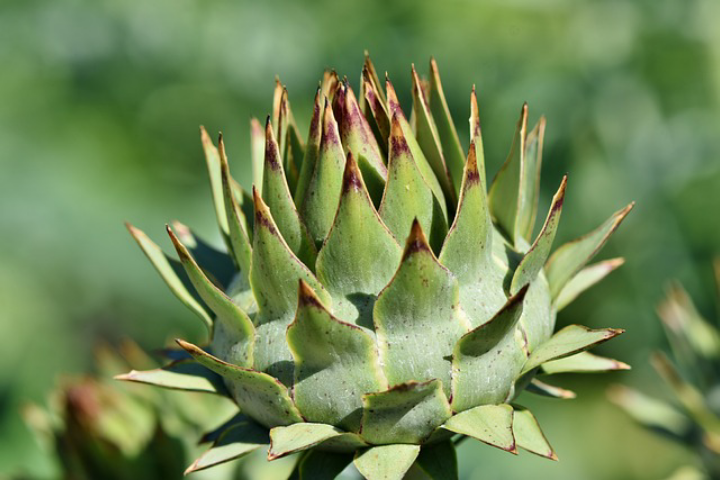
Artichokes are large, ball-shaped thistles with fleshy, edible leaves. The fleshy part of the plant is known as the “heart” and can be cooked or eaten raw. It has a slightly nutty flavor and is often used in salads and soups. Artichokes are rich in dietary fiber, vitamins A, C, K, magnesium, potassium, iron and calcium. They are also an excellent source of antioxidants.
Origin and disrtibution
The artichoke is believed to have originated in the Mediterranean region, particularly in Southern Europe and Northern Africa. It was introduced to the United States in the early 1600s by French and Spanish settlers. Today, it is widely cultivated across Europe as well as North America and parts of South America, Australia, New Zealand, South Africa and Asia.
Nutrition facts
One cup (156 grams) of cooked, boiled artichoke provides the following nutrients:
Calories: 60
Protein: 4.2 g
Carbs: 13.4 g
Fiber: 6.9 g
Fat: 0.3 g
Vitamin C: 14% of the RDI
Vitamin K: 28% of the RDI
Folate: 16% of the RDI
Manganese: 20% of the RDI
Health benefits
- High in Fiber: Artichokes are a great source of dietary fiber, with one medium artichoke providing 10.3 grams, or 41 percent of the recommended daily value (DV).
- Rich in Antioxidants: Artichokes are a rich source of antioxidants, specifically flavonoids and polyphenols.
- Liver Protection: Studies suggest that artichoke extract may help protect the liver from damaging toxins.
- Improved Digestive Health: Artichokes contain high amounts of prebiotic fiber, which is beneficial for digestion and gut health.
- Improved Heart Health: Studies have suggested that artichokes may help reduce levels of “bad” LDL cholesterol and triglycerides, as well as raise levels of “good” HDL cholesterol.
- Blood Pressure Management: Animal studies suggest that artichoke leaf extract may help reduce blood pressure by improving blood vessel flexibility and elasticity.
- Potassium Content: Artichokes are also a good source of potassium, which can be beneficial for controlling blood pressure levels as well as other bodily functions such as nerve signals and muscle contractions.
- Vitamin C Content: A single artichoke provides 13 percent of the DV for vitamin C, an essential nutrient with powerful antioxidant capabilities that can help support the immune system and maintain healthy skin and bones.
- Vitamin K Content: Artichokes are also a good source of vitamin K – one medium artichoke contains 26 percent of the DV – an important nutrient involved in blood clotting, bone health and calcium absorption in the body.
- Copper Content: Artichokes are a good source of copper – one medium-sized artichoke contains 16 percent of the DV – a mineral required for energy production and antioxidant enzyme function throughout the body
How to consume
To consume artichoke, start by steaming or boiling the vegetable for about 25 minutes. Once cooked, use a fork and knife to remove the soft inner leaves and dip them into butter or a sauce of your choice before scraping off the fleshy pulp with your teeth. The center of an artichoke is also edible and can be eaten raw or cooked. You can also top cooked artichokes with cheese, herbs, spices, or a variety of sauces. Additionally, you can use artichoke hearts in salads, pasta dishes, casseroles, and more.
Precautions
The general recommendation is to avoid artichokes during pregnancy due to the possibility of negative side effects. Artichokes contain a compound called cynarin, which has been associated with uterine contractions and can potentially lead to preterm labor or miscarriage. Additionally, artichokes may contain high levels of oxalate which can increase the risk of kidney stones. Therefore it is advised that pregnant women should not eat artichokes to reduce these risks.
Summary
Artichokes have been touted as a health food for centuries due to their high nutritional value and health benefits. , rich in minerals. Artichokes also contain several antioxidants that help protect the body from cellular damage caused by free radicals.Its high dietary fiber content may help lower cholesterol levels. It is thought to reduce the risk of certain types of cancer. Artichokes are known to aid digestion and also act as a natural diuretic. Finally, artichokes have anti-inflammatory properties that reduce pain associated with arthritis.
- Watermelon Seeds as a Natural Remedy for High Blood Pressure- Better Cardiovascular Health HubHigh blood pressure, also known as hypertension, is a growing concern globally due to its association with various health complications. While there are pharmaceutical treatments..
- Meditation and Yoga for Arthritis Pain: 20 Practices to Try – Better Holistic Medicine
- Ensuring you get enough sleep is crucial for maintaining your overall health. Learn why sleep is important and how you can improve your sleep habits. – Better Holistic HealthSleep is one of the most essential aspects of maintaining a healthy lifestyle. From improving your memory and focus to regulating your mood and immune..
- Have you ever wondered what the difference is between a balanced diet and a crash diet – Better Holistic HealthWhen it comes to losing weight and maintaining a healthy lifestyle, people often turn to various diets to achieve their goals. However, there is a..
- Did you know that stress is one of the leading causes of weight gain? Learn how to manage stress and maintain a healthy weight with these tips – Better Holistic HealthStress has become a common part of our lives today, with most of us experiencing it in one form or another. Whether it’s work-related stress,..